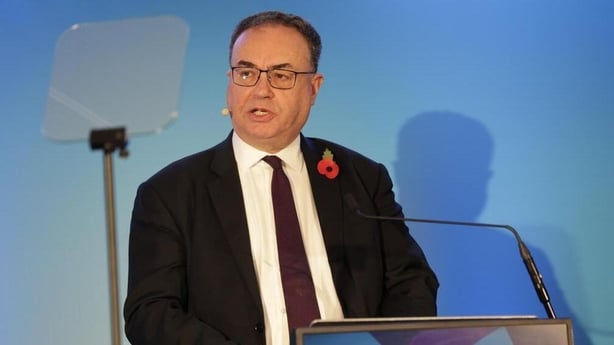The Bank of England stuck to its guns today and said UK interest rates needed to stay high for "an extended period", a day after the US Federal Reserve signalled it would cut US interest rates next year.
The Bank of England's Monetary Policy Committee today voted 6-3 to keep rates at a 15-year high of 5.25%, in line with economists' expectations in a Reuters poll last week.
There was no discussion of cutting interest rates, and the Bank of England remains concerned that inflation in Britain will continue to be stickier than in the US and the euro zone.
The central bank also largely shrugged off data showing a slowdown in wage growth and a 0.3% fall in gross domestic product in October - which raises the prospect of a recession in the run-up to a national election expected for 2024.
The Bank of England's policy stance - which assumes a gradual fall in interest rates to 4.25% in three years' time - is sharply at odds with the latest market expectations which see rates dropping to that level before the end of next year.
"Successive rate rises have helped bring inflation down from over 10% in January to 4.6% in October. But there is still some way to go. We'll take the decisions necessary to get inflation all the way back to 2%," Governor Andrew Bailey said.

The three policymakers who dissented wanted a further hike to 5.5%, and for most of the remainder the decision not to raise rates had been "finely balanced", minutes of their policy discussion showed.
The Bank of England's main policy message is unchanged from November, when it forecast it would take two years to return inflation to target.
Although the near-term outlook for inflation was likely to be slightly lower than the Bank of Englad expected last month, policymakers' longer-term concerns remained.
"Relative to developments in the US and the euro area, measures of wage inflation were considerably higher in the United Kingdom and services price inflation had fallen back by less so far," the Bank of England said.
However, British 10-year government bond prices have fallen by a full percentage point since late October as markets bet on looser central bank policy in Britain as well as abroad.
The Bank of England noted that bond yields had fallen "materially" and said it would take this into account in its next quarterly forecast update in February.
A November 22 budget statement by finance minister Jeremy Hunt was likely to boost gross domestic product by a quarter of a perentage point over coming years, but have more limited inflation implications, the Bank of England added.
The only Bank of England policymaker to have discussd the timing of a rate cut recently has been Chief Economist Huw Pill who shortly after November's decision said the market expectations then for a first rate cut in August 2024 "doesn't seem totally unreasonable".
Two days later, Bailey said it was "really too early" to discuss when rates might be cut.

